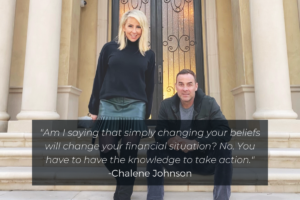Are you worthy of wealth?
What about extreme wealth?
Let me ask that another way…
Do you expect that you will be wealthy enough to live exactly the way you desire, travel when you want, buy things just because and never have to worry about money?
If those kinds of questions make you squirm a little… your money mindset might just be what stands in the way of you achieving financial freedom.
Most of us have beliefs around money, wealth, and “rich people” deep in our subconscious, programmed in our earliest years.
Some of us have been unknowingly behaving, acting, or even sabotaging in ways that help us to substantiate those deeply held, and often limiting beliefs.
If you’re someone who desires greater freedom, let’s face it, having more money would make that easier. And having a lot more money would make it a lot easier,
So what might be standing in your way?
Well, certainly there are sometimes circumstances outside our control. But in my 30 plus years of helping people create the life they desire, I have found more often than not it is a mindset.
Mindset is not the only key to financial freedom, but without out, your battle becomes insurmountable.
I would love to tell you that achieving financial freedom is as simple as finding a specific side hustle to start with.
But, the truth is, you’ve got to take a look at yourself.
Now, answer yes or no to the following 12 questions to evaluate your money mindset.
What is your money mindset?
- Do you believe that money is scarce and hard to come by?
- Do you feel guilty or fearful or uncomfortable when you think about yourself having a lot of money?
- Do you believe that very wealthy people must be inherently greedy or unethical?
- Do you believe that you have to work extremely hard to make a lot of money?
- Do you believe that it’s impossible for you to become one of the wealthiest people you know?
- Do you feel unworthy of extreme wealth?
- Do you believe that the more money somebody makes, the more problems they have?
- Do you believe that you will have to sacrifice your personal happiness or some other relationship to achieve financial success?
- Do you believe that you have to guard your savings and that investing is something very risky?
- Do you believe that you’re lousy and are just not that good at managing money?
- Do you believe that it’s too late for you to dramatically change your financial situation?
- And lastly, do you believe that talking about money is taboo or uncomfortable?
If you answered yes to a few of these, that’s normal.
Even with as much work as I have done on my money mindset, I answer yes to at least two or three..
But if you answered yes to a lot of those, that’s a clear indicator that your beliefs around money that’s preventing you from experiencing the financial freedom you desire.
Achieving and maintaining a positive money mindset is crucial for financial success and overall well-being.
So instead of asking others what you need to do to get more money, ask yourself what limiting beliefs you need to adjust.
Define limiting beliefs
Let’s elaborate on the attitudes mentioned above and how they relate to cultivating a positive money mindset.
- Scarcity: If you believe that money is scarce and hard to come by, you may develop a scarcity mindset. This mindset can lead to fear, anxiety, and unhealthy financial decisions.
- Discomfort: Feeling guilty, fearful, or uncomfortable about having a lot of money can create self-sabotaging behaviors that hinder financial success.
- Assumptions: Believing that very wealthy individuals are inherently greedy or unethical can create a subconscious aversion to wealth.
- Work Ethic: While hard work is essential for financial success, an extreme belief in it might lead to burnout and neglect of other aspects of life.
- Personal Wealth: If you believe it’s impossible for you to become wealthy, you may not take the necessary steps to improve your financial situation.
- Undeserving: Feeling unworthy of extreme wealth can lead to self-sabotaging behaviors that hinder financial growth.
- Complications: Assuming that more money always brings more problems can create a subconscious resistance to financial growth.
- Sacrificing: Believing that you have to sacrifice personal happiness or relationships for financial success can lead to unhappiness and dissatisfaction.
- Fear of Investing: While it’s essential to be cautious about financial decisions, excessively guarding savings and avoiding investing can limit wealth-building opportunities.
- Self-esteem: Believing that you’re not good at managing money can lead to financial mismanagement.
- Too Late: Thinking it’s too late to change your financial situation can hinder your ability to make positive financial choices
- Taboo: Considering money as a taboo or uncomfortable topic can prevent you from seeking advice, sharing knowledge, or learning about personal finance.
To achieve and maintain a positive money mindset, it’s essential to identify and challenge any limiting beliefs or negative attitudes about money.
By embracing a more optimistic perspective towards money, you can make informed decisions, set and achieve financial goals, and create a healthier relationship with your finances.
Now, let’s explore some strategies to overcome the negative beliefs and attitudes and cultivate a positive money mindset
Adjust your mindset
Scarcity
- Educate yourself on financial literacy and different ways to create wealth
- Appreciate what you have and seek opportunities for growth
- Practice gratitude regularly to shift your mindset away from scarcity
- Acknowledge that money is abundant and there are multiple opportunities to build wealth.
Discomfort
- Reflect on the reasons behind these emotions and challenge irrational beliefs
- Remind yourself that financial success allows you to support yourself and others
- Set financial goals aligned with your values and aspirations
- Recognize that it’s okay to desire and pursue wealth as long as it’s earned ethically and used responsibly.
Assumptions
- Seek out inspiring stories of wealthy individuals who use their resources for the greater good
- Surround yourself with positive role models who have achieved financial success while maintaining integrity
- Recognize that wealth doesn’t define a person’s character, and unethical behavior can be found in any income bracket.
Work Ethic
- Find a balance between hard work and self-care to avoid burnout and ensure sustainable success
- Explore passive income streams and investments that can generate wealth without constant physical effort
- Value hard work, but also acknowledge the importance of balance and smart financial strategies.
Personal Wealth
- Visualize financial goals and affirm your ability to achieve them
- Break down financial goals into smaller, manageable steps
- Seek support from mentors or financial advisors who can provide guidance and encouragement
- Encourages self-belief and the pursuit of financial goals.
Undeserving
- Celebrate accomplishments and acknowledge strengths
- Surround yourself with a supportive network that believes in your potential
- Practice self-compassion and recognize that you are deserving of financial success.
Complications
- Focus on using wealth to solve problems
- Reframe your perspective on challenges and view them as opportunities for growth and learning.
Sacrificing
- Set clear boundaries between work and personal life
- Prioritize what matters to you, and ensure that financial goals align with values
- Seek to achieve both financial prosperity and personal fulfillment.
Fear of Investing
- Educate yourself about different investment options
- Develop an emergency fund to provide a sense of security
- Consult with a financial advisor
- Value informed financial choices and the potential for growth through strategic investments.
Self-Esteem
- Take small steps to improve your financial skills and gradually build confidence
- Seek financial education resources, courses, or workshops
- Monitor financial progress and celebrate small improvements in money management.
Too Late
- Embrace a growth mindset and believe in your capacity to learn and improve
- Set specific financial goals and develop a plan to achieve them
- Recognize that financial improvement is possible at any stage in life.
Taboo
- Start by talking about money with trusted friends or family members
- Seek out financial advice or coaching
- Join financial forums or online communities to engage in open discussions about personal finance
- Encourage open conversations about money and financial literacy.
Be patient with yourself, and practice self-compassion as you work towards developing a positive money mindset.
I encourage you to take some time and think about your childhood.
Think about where you picked up things, who you were exposed to, what you saw, what you experienced, and how it may have shaped your beliefs, subconsciously, or consciously.
This will help you to understand where your limitations are today. And how can they continue to evolve even if you are in a great situation and can’t believe how fortunate you are.
In that case, I hope that you have a sense of gratitude.
When I was eight or nine, I told my dad I wanted a pair of wheelie shoes that cost $50. For his surprising response, check out episode #1008 of The Chalene Show.
Here’s why you want to listen to episode #1008 – Improve Your Money Mindset…
- How the church can influence our money mindset
- Mindset struggles I still face today
- My real feelings about moving to a wealthy neighborhood
- Personal stories that molded my money mindset
- How I increase my self-worth
Check out the following links for more mindset tips
TCS #959 – Dollars and Sense: Making Money and Investing Simply
TCS #914 – So How Do You Actually Change Your Mindset?
TCS #827 – How to Create a Mindset That Attracts Prosperity and Abundance
BYT #709 – Work-Life Balance | Hustle, Family, & Social Media | with Sean Cannell
BYT #545 – Why Having an Abundance Mindset is Important for Your Business
BYT #527 – Entrepreneur Mindset | Small Changes Lead to Big Results
Additional resources
Prosperity Consciousness – How to Tap Your Unlimited Wealth
Stop Overthinking by Nick Trenton
The Psychology of Money by Morgan House





